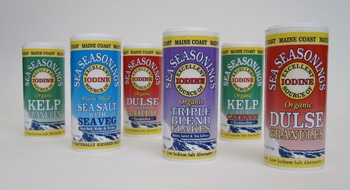Happy Good For You Friday! This is something I’ve been meaning to write about for, like, two years. While I was pregnant, my sweet Aunt Kathleen sent me this article about iodine and how important it is for both fetal and early childhood neurodevelopment. It literally makes a difference in IQ.
Iodine is also essential for optimal thyroid function. These days, many women have problems with hypothyroidism, or a low-functioning thyroid. This can lead to a sluggish metabolism, fatigue, trouble concentrating, depression, feeling cold all the time, low sex drive and even infertility problems and increased chance of miscarriage. (Sidenote: Western medicine tends to under-diagnose hypothyroidism. If you are curious about your thyroid function, get a full thyroid blood-panel, including TSH and have a naturopath check out the results. What they consider to be healthy thyroid levels differs from many Western Medicine docs’ opinions.)
Despite the availability of iodized salt in the US, most of us are still iodine-deficient; many people are opting to cook with sea salt, (which does have its own set of benefits) and the salt used in processed food is not usually iodized.
So, how much iodine do you need and how are you going to get it into your diet? You could take supplements, but most of us don’t need to go that far, and it’s a good way to swing the pendulum into the other direction, which isn’t healthy, either. You could eat seaweed a few times a week, or you could season your food with Maine Coast Sea Seasonings. My favorite is the Dulse with Garlic. I add it to almost everything. If you are looking for extra flavor (and iodine), but you don’t want the bloat from salt, it’s a great alternative – and it doesn’t taste “weird”. Are there other good sources of iodine? Well, you would have to eat about 40 lb. of fresh vegetables and/or fruits to get as much iodine as you would from 1 gram of whole leaf kelp….
How much iodine do we need? According to the National Institutes of Health (NIH):
- Adults 18 and older should get 150 mcg daily
- Pregnant women 18 and older, 220 mcg
- Lactating women, 290 mcg.
- Infants 0-12 months, 50 mcg
- Children 1-8 years, 90 mcg
- Children /young teens 9-13,120 mcg
- Teens 14-18, 150 mcg.
* I’m not being paid to promote Maine Coast, I just really like their product and use it in my home all the time. Bare Beauty never publishes sponsored posts. *
…..
I’ve spent almost a decade immersed in the world of green beauty and nontoxic living. I want to help you find everything from a killer lipstick to a nontoxic laundry detergent, and beyond. Subscribe to a healthier lifestyle with me.

Thank you for subscribing!


